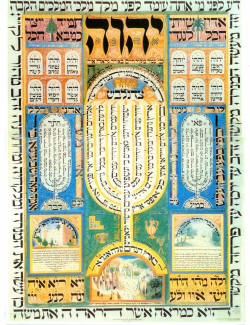שבועות

The Dawn of Revelation
In the early hours of the sixth day of Sivan, 2448 on the Hebrew calendar, the tranquil silence of the Sinai desert was shattered by the majestic sound of a shofar. With each passing moment, the number of shofars and the intensity of their powerful blast grew. The earth and sky trembled, lightning and thunder created an extraordinary atmosphere as if the world was coming to an end. A strange feeling of fear and anxiety spread throughout the camp of the Children of Israel. Their knees weakened, and they lost the strength to stand. They held their breath, all eyes fixed on Mount Sinai, stunned and awestruck.
Suddenly, it felt as if time stood still, and a heavenly voice resounded with unparalleled power from horizon to horizon. It was a voice unlike any that mankind had ever heard, a voice from the core of creation that the entire nation heard. It said:

- I am the Lord your God.
- You shall have no other gods except Me.
- Do not take the name of the Lord in vain.
- Remember and uphold the Sabbath.
- Honor your father and your mother.
- Do not commit murder.
- Do not commit adultery.
- Do not steal.
- Do not bear false witness against your neighbor.
- Do not covet your neighbor’s possessions.


A Unique Day in Human History
Delivery of Divine Law
The day of Shavuot is unique in the entire history of mankind. This is the day when God revealed Himself in Divine glory on Mount Sinai to the Children of Israel to give them His Law. He delivered His words directly in the form of the Ten Commandments on two stone tablets through Moses ben Amram to our ancestors. These laws were presented as the first Divine constitution to the world, heralding peace and justice, love, freedom, mutual respect, and other qualities of a civilized human being.
Declaration of obedience
Our ancestors attained the highest level of spirituality before God when they received the tablets. They proclaimed, “נעשה ונשמע”, meaning, “We shall obey first, and seek to understand it later”. They accepted God as the one and only Creator.
Shavuot: A Brief but Important Festival
Despite lasting just two days, Shavuot is one of the most significant Jewish festivals, comparable to Passover and Sukkot. Jewish scholars have interpreted the sanctity of Shavuot in various ways, highlighting its profound importance.
Festival of Weeks
One of its meanings is “The Festival of Weeks”, as mentioned in Exodus (34:22): “Count for yourself seven weeks, and at the beginning of the harvest, start counting seven weeks, and observe the Festival of Weeks to honor the Lord your Creator.”
In commemoration of our ancestors receiving the Torah, we count the days from the second night of Passover for forty-nine days, or seven weeks, until the appointed day.
Festival of Harvest
Another name for this festival is the “Festival of Harvest”, marking the beginning of the wheat harvest season, which is why the Book of Ruth (part of the Prophets section of Tanakh) is read in synagogues on this day. Additionally, Shavuot is the anniversary of King David’s death, and the book contains references to his lineage.
The Book of Ruth is also read because it explains the agricultural ceremonies during the Festival of Harvest. Moreover, it describes Ruth’s loyalty and commitment to the Divine faith, similar to the feelings of the Jews at Mount Sinai when they received the Torah and pledged their loyalty to God by saying, “We shall obey first, and seek to understand it later” (נעשה ונשמע).
The agricultural connection
Shavuot is also known as the “Festival of First Fruits” (Bikkurim, Hebrew: חג הקציר). During this festival, the first fruits and grains are offered to God as a token of gratitude for His blessings, emphasizing the importance of agriculture. These offerings were traditionally brought to the Holy Temple in Jerusalem. As stated in Exodus 23: “Bring the best of the firstfruits of your soil to the house of the Lord your God…”
A Time of Assembly
The Talmud calls this festival “Atzeret” (Hebrew: עצרת), meaning assembly, symbolizing the gathering of pilgrims during that time at the Temple. The most significant aspect is the anniversary of the giving of the Ten Commandments to the Children of Israel seven weeks after their exodus from Egypt.
Shavuot: The Completion of Passover
Just as Passover symbolizes the liberation of the Children of Israel from slavery in Egypt, Shavuot is the continuation and completion of Passover, representing spiritual and intellectual freedom. It signifies reaching the goals of the Torah.
A Time for Vigils and Decorations
According to ancient tradition, on Shavuot, Jews decorate synagogues and homes with beautiful flowers and stay awake until the first rays of dawn appear, engaged in Torah reading, believing that this path leads to ultimate perfection, and end with Shacharit morning prayers.


 فارسی
فارسی